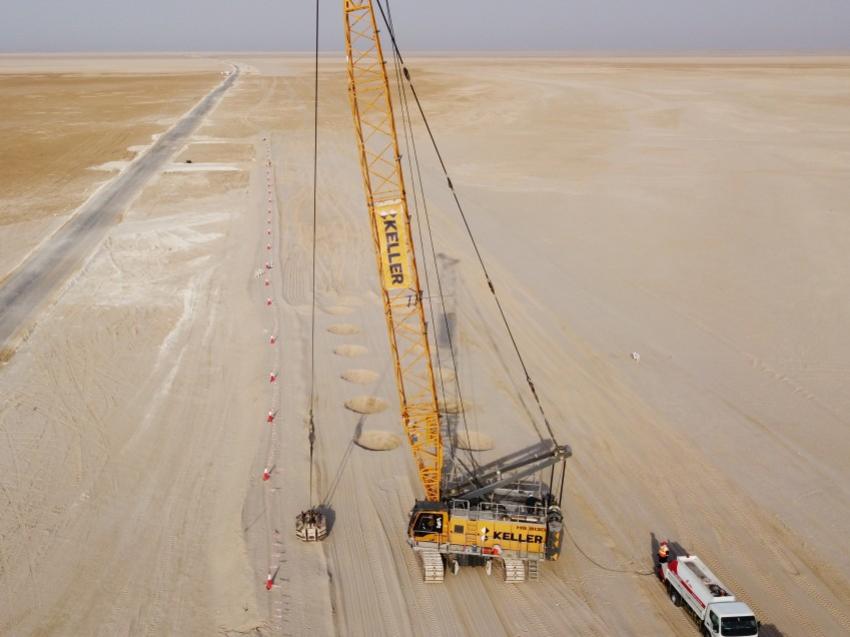Keller is leading the way for ground-improvement works on the largest infrastructure project in the United Arab Emirates. A major new rail network that will create new connections among the nation’s emirates, including Dubai and Abu Dhabi, and help spur sustainable economic growth.

Scheduled for completion by 2024, the 1,200km rail network will stretch from Ghuweifat in the west to Shah in the South and Fujairah on the East coast near Oman. The lines will then connect with rail services in neighbouring Gulf countries.
The project is expected to serve around 16 million passengers a year and transport 50 million tonnes of freight – significantly reducing road traffic emissions and acting as a catalyst for trade and social development.
The first part of stage two of the project got underway last year, with Keller awarded a contract for ground-improvement works for around 660,000km2 along a 13km stretch of the new line.
“We were working in a remote area close to the Saudi Arabian border, where the soil conditions are very difficult,” explains Ahed Kharbtli, Project Manager. “It’s what we call sabkha – very loose, heterogenous soils that are hard to predict. We had many meetings with the owner and the contractor – a joint venture between China State Construction and SK Engineering & Construction – to put together a solution that was technically and commercially viable.”
Meticulous planning
Detailed planning has been key to this project, with Keller’s expert engineers analysing the ground conditions and then dividing up the site into numerous sections between 30m and 115m wide, based on the required techniques.
In sections where shallow, coarse-grained soils up to 2m deep needed to be densified, the team have used the rapid impact compaction technique – a high-frequency method using a hammer that repeatedly strikes an impact plate placed on the ground.
In areas where the soils required improving up to 10m, the team switched to heavy dynamic compaction / replacement. This involves the controlled release of a crane-hoisted tamper weight free falling to the ground, densifying the soils in a regular grid pattern.
To improve sections where there was weak, fine-grained soils that will support structures with high settlement criteria, the team implemented a variation on dynamic compaction – known as dynamic replacement. This involves using a crane-hoisted weight to drive columns of stiffer material, such as sand, stones or recycled concrete, into the ground.
More packages in the pipeline
The area is some 400km from the company’s Middle East head office in Dubai, so logistics and finding accommodation proved challenging. A mechanic was on site full time, and a workshop was set up to maintain the machines, avoid breakdowns and ensure continuously high production rates.
As with every aspect of life, the COVID pandemic also had an impact on the project, with regular testing for the crew and numerous safety precautions in place.
Keller successfully completed the scope at the end of January and, as a result of its impressive approach and high-quality work, has been awarded an additional package for dynamic replacement at the Industrial City of Abu Dhabi.
“I’m really proud to have been part of this great team,” says Ahed. “Our assessments and design gave the clients a lot of confidence. And everything we’ve done, from our technical submissions, to the execution itself with high safety standards, has been held up as an example for all other contractors on this site. You could say we’ve set the standard for what is one of UAE’s strategic projects of high importance.”